

Facebook’s ‘Reconnect’ Strategy is Brilliant. Recently, in addition to giving you suggestions to which friends you might add to your profile, Facebook also started enticing users to reconnect and engage less active users.
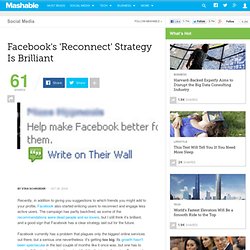
The campaign has partly backfired, as some of the recommendations were dead people and ex-lovers, but I still think it's brilliant, and a good sign that Facebook has a clear strategy laid out for the future. Facebook currently has a problem that plagues only the biggest online services out there, but a serious one nevertheless: it's getting too big. Its growth hasn't been spectacular in the last couple of months like it once was, but one has to wonder if it's simply nearing the natural limit for that type of service.
Facebook is the New Google « VCMike's Blog. A year ago the venture community scoffed at application startups who were dependent on Facebook.
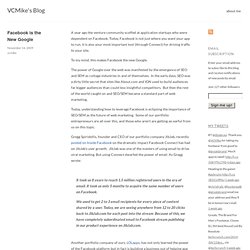
Today, Facebook is not just where you want your app to run, it is also your most important tool (through Connect) for driving traffic to your site. To my mind, this makes Facebook the new Google. The power of Google over the web was manifested by the emergence of SEO and SEM as cottage industries in and of themselves. In the early days, SEO was a dirty little secret that sites like About.com and IGN used to build audiences far bigger audiences than could less insightful competitors. But then the rest of the world caught on and SEO/SEM became a standard part of web marketing. A Little Perspective (Digg, Twitter, Facebook) It wasn’t all that long ago that Digg captured our collective imagination.
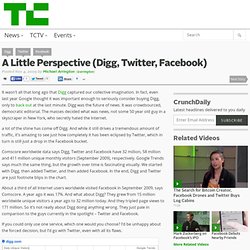
In fact, even last year Google thought it was important enough to seriously consider buying Digg, only to back out at the last minute. Digg was the future of news. It was crowdsourced, democratic editorial. The masses decided what was news, not some 50 year old guy in a skyscraper in New York, who secretly hated the Internet. How much has Facebook’s valuation grown this year? Not much, say.
Has a bull market help lift Facebook’s value in the eyes of investors?
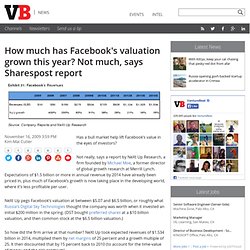
Not really, says a report by NeXt Up Research, a firm founded by Michael Moe, a former director of global growth research at Merrill Lynch. Expectations of $1.5 billion or more in annual revenue by 2014 have already been priced in, plus much of Facebook’s growth is now taking place in the developing world, where it’s less profitable per user. NeXt Up pegs Facebook’s valuation at between $5.07 and $6.5 billion, or roughly what Russia’s Digital Sky Technologies thought the company was worth when it invested an initial $200 million in the spring. (DST bought preferred shares at a $10 billion valuation, and then common stock at the $6.5 billion valuation.)
So how did the firm arrive at that number? Of course, valuations are a rough science particularly when there aren’t exactly comparable companies trading on the public market at this time. Facebook Revenues Screaming Toward $1 Billion. Facebook's $1 Billion Revenues Explained In 25 Words. Facebook Now Takes PayPal. Marketing & Facebook.
Facebook's Zuckerberg Says The Age of Privacy is Over. Facebook founder Mark Zuckerberg told a live audience yesterday that if he were to create Facebook again today, user information would by default be public, not private as it was for years until the company changed dramatically in December.
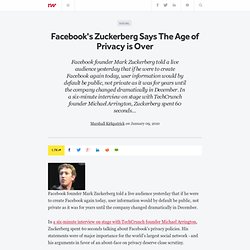
In a six-minute interview on stage with TechCrunch founder Michael Arrington, Zuckerberg spent 60 seconds talking about Facebook's privacy policies. His statements were of major importance for the world's largest social network - and his arguments in favor of an about-face on privacy deserve close scrutiny. Zuckerberg offered roughly 8 sentences in response to Arrington's question about where privacy was going on Facebook and around the web.
The question was referencing the changes Facebook underwent last month. Your name, profile picture, gender, current city, networks, Friends List, and all the pages you subscribe to are now publicly available information on Facebook. Facebook Revenues Up to $700 Million in 2009, On Track Towards $ Facebook is tight-lipped about its revenue numbers, which is typical of private companies.
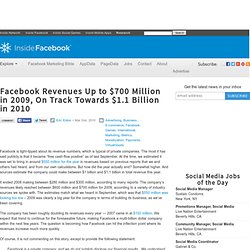
The most it has said publicly is that it became “free cash-flow positive” as of last September. At the time, we estimated it was set to bring in around $550 million for the year in revenues based on previous reports that we and others had heard, and from our own calculations. But how did the year actually end? Somewhat higher. WSJ: Facebook Revenues For 2010 Could Hit Between $1.2 To $2 Bil. Late last year, we published a list of the top 10 IPO candidates of 2010.
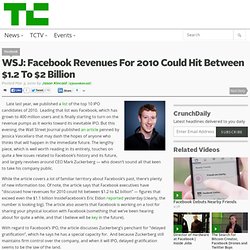
Leading that list was Facebook, which has grown to 400 million users and is finally starting to turn on the revenue pumps as it works toward its inevitable IPO. But this evening, the Wall Street Journal published an article penned by Jessica Vascellaro that may dash the hopes of anyone who thinks that will happen in the immediate future. The lengthy piece, which is well worth reading in its entirety, touches on quite a few issues related to Facebook’s history and its future, and largely revolves around CEO Mark Zuckerberg — who doesn’t sound all that keen to take his company public. While the article covers a lot of familiar territory about Facebook’s past, there’s plenty of new information too. With regard to Facebook’s IPO, the article discusses Zuckerberg’s penchant for “delayed gratification”, which he says he has a special capacity for.
Investors Bet on Price of Facebook IPO - Digits. Facebook Looks To Be Partnering With Eventbrite To Monetize Even. Hitwise says Facebook Most Popular U.S. Site. Pandora and Facebook: So Happy Together. The leading online radio service and world’s biggest social network have forged a bond that will solidify both companies’ dominance, while offering music fans a way to share music with each other that appears to lack any significant downside.
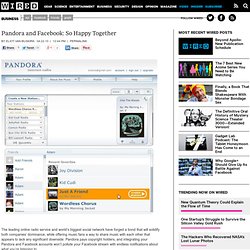
Pandora pays copyright holders, and integrating your Pandora and Facebook accounts won’t pollute your Facebook stream with endless notifications about what you’re listening to. The upside for Pandora users is significant, due to the ways in which it broadcasts their taste, helps them discover and enjoy new music through their friends. There are countless ways to do these exact same things elsewhere on the web, and you’ve already been able to share Pandora stations with friends.
But Pandora + Facebook = such easy math that even the busy or excessively lazy can integrate it into their lives. This joint announcement is twofold. Integrating your accounts widens your listening options considerably, and immediately. Why it is too late to regulate Facebook. I’ve seen a lot of angst over the past week about Facebook’s moves to open up your data to other applications.

To really understand how huge these changes are I had to get away from Silicon Valley and come and hang out with the geeks in Kinneret, Israel where famous VC Yossi Vardi is throwing an exclusive camp for geeks and successful business innovators.
The Age Of Facebook. Two years ago I was on the Charlie Rose show and we talked about, among other startups and trends, Facebook.
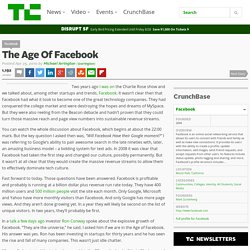
It wasn’t clear then that Facebook had what it took to become one of the great technology companies. They had conquered the college market and were destroying the hopes and dreams of MySpace. But they were also reeling from the Beacon debacle and hadn’t proven that they could turn those massive reach and page view numbers into sustainable revenue streams. You can watch the whole discussion about Facebook, which begins at about the 22:00 mark. But the key question I asked then was, “Will Facebook Have their Google moment?” Fast forward to today. The FriendFeedization Of Facebook Continues: Bret Taylor Promote. Facebook has a new chief technology officer, Bret Taylor. The FriendFeed co-founder and initial product manager of Google Maps came to Facebook with the $50 million acquisition of FriendFeed last year.
He took on the role of director of platform at Facebook, and led the recent rollout of Facebook’s Open Graph and Open Graph API, which attempts to make social connections on the Web as important as hyperlinks. He played a key role in making the Facebook platform much simpler to build on.